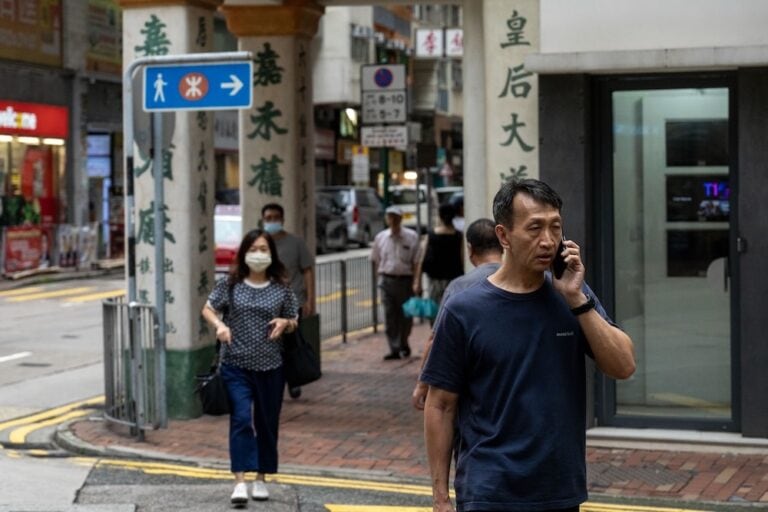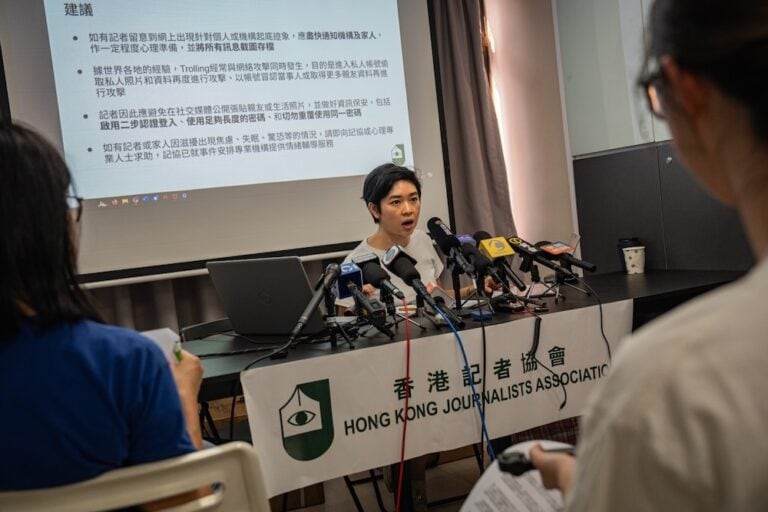(CPJ/IFEX) – Although on the surface little seems to have changed, the “climate of free expression in Hong Kong has shifted in subtle but distinct ways,” says the Committee to Protect Journalists (CPJ) in a report released on 24 September 1997 on press freedom in the former British colony. “In the vibrant Hong Kong press, […]
(CPJ/IFEX) – Although on the surface little seems to have
changed, the “climate of free expression in Hong Kong has shifted
in subtle but distinct ways,” says the Committee to Protect
Journalists (CPJ) in a report released on 24 September 1997 on
press freedom in the former British colony.
“In the vibrant Hong Kong press, self-censorship has become a
fact of life,” reports the title article, “Press Freedom Under
the Dragon: Can Hong Kong’s Media Still Breathe Fire?”, written
by A. Lin Neumann, CPJ’s Asia program coordinator. The full
report was released at a press roundtable at the Foreign
Correspondents Club in Hong Kong. “Newspapers owned by powerful
business leaders with wide-ranging economic interests in China
have become less willing to criticize Beijing,” Neumann says.
Yet, he points out, “Even the most critical dailies have
continued to publish without overt reprisals.”
The report is available on CPJ’s Web site: http://www.cpj.org It
includes articles by Liu Kin-ming of the Hong Kong Journalists
Association on self-censorship as censorship; by Joseph Kahn of
“The Asian Wall Street Journal” on the “retreat” of “Ming Pao”,
the daily newspaper once known as Hong Kong’s most critical
voice; and by freelance correspondent David Lindorff on the
future for young journalists in China. CPJ executive director
William A. Orme, Jr. writes on prospects for press freedom in
China and Hong Kong. Attacks on the press in China and Hong Kong
in 1996 and 1997 — ranging from harassment and censorship to
expulsion — are documented, including the cases of seventeen
journalists serving prison sentences in China.
With Hong Kong the long-reigning media capital of East Asia, much
is at stake, Neumann notes. “The vibrancy not just of local media
but of the vast network of regional and international press
operations” based in Hong Kong has made it, for both English- and
Chinese-language media, a safe-haven for reporting about the
international political and economic affairs of China. “If this
dynamic journalism culture disappears or is significantly eroded,
it will have profound repercussions for all of Asia,” he writes.
“Equally important to the region’s future is the inextricable
relationship between the free flow of information and the
strength of financial markets,” he continues. Neumann also
stresses the linkage between conditions in Hong Kong and
developments in China, where privatization of the economy is a
goal newly articulated at the recent 15th Party Congress.
“Success in Hong Kong will be measured in large part by freedom
of information and the rule of law,” Neumann notes. Given China’s
“record of inflexibility toward the press on the mainland,” it is
no wonder that the journalistic world is wondering if China will
also act to rein in Hong Kong’s “feisty journalistic culture.”


